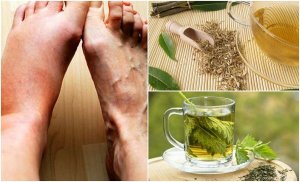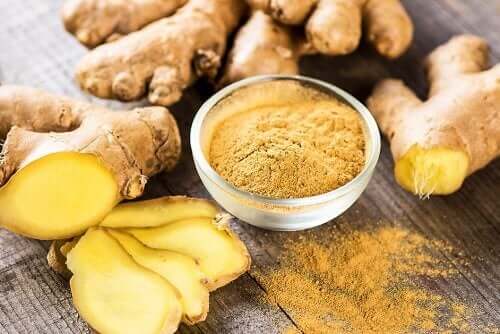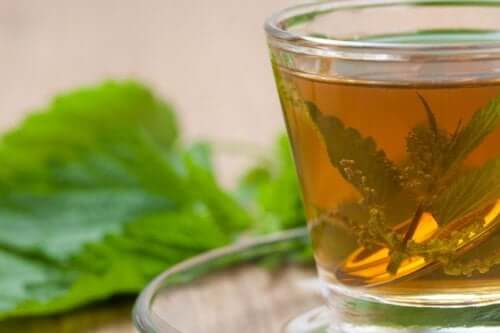Six Herbal Teas to Lower Uric Acid Levels

Do you need to lower your uric acid levels? The body produces this waste when it metabolizes the purines that some foods contain. Normally, the kidneys are in charge of filtering it and, later, of eliminating it through the urine. So, did you know that you can use herbal teas to lower uric acid levels?
However, sometimes, there are difficulties in carrying out this process, since the body produces too much of it or reduces its ability to expel it. As a consequence, a disorder known as hyperuricemia originates, which can trigger other problems, such as gout.
Medical treatment usually includes drugs to reduce uric acid production and anti-inflammatory drugs. However, milder cases can be controlled with diet and supplements. Today, we propose six herbal teas to lower uric acid levels.
Herbal teas to lower uric acid levels
It’s very important to help your body reduce uric acid levels. Although uric acid accumulation initially goes unnoticed, over time, it can cause joint inflammation and pain. Thus, if your blood tests showed high uric acid levels, it’s essential to follow some treatment to regulate them.
Natural remedies, including herbal teas, stimulate kidney function to facilitate uric acid excretion through urine. However, it’s important to consult your doctor before drinking them, since they aren’t appropriate in certain cases.
Discover: How to Make an Anti-inflammatory Diet to Treat Uric Acid
1. Ginger tea

Scientific evidence suggests that consuming ginger tea decreases the pain associated with uric acid accumulation in the joints. Although further evidence is needed to corroborate these effects, this remedy is a good option to complement the treatment of conditions such as gout.
Ingredients
- 1 teaspoon of grated ginger root (7 g)
- 1 cup of water (250 ml)
- Honey (optional)
Preparation
- Firstly, pour the grated ginger into a cup of water.
- Bring the drink to a boil and let stand for a few minutes.
- Finally, strain and sweeten with a little honey.
How to consume
- Drink a cup of tea mid-morning and then once or twice more throughout the day.
- Drink for 15 days in a row, then rest for a week, and then start again.
2. Celery tea
Celery tea is a useful remedy to lower blood uric acid levels. For many years, it’s been one of the best supplements against gout, fluid retention, and urinary problems.
Ingredients
- 1 tablespoon of celery leaves (15 g)
- 1 cup of water (250 ml)
Preparation
- Boil the celery leaves in a cup of water.
- Then, let the drink stand and strain it.
How to consume
- Drink a cup of celery tea on an empty stomach and repeat its intake twice a day.
- Drink at least three times a week.
3. Nettle tea

This herbal remedy is traditionally used for problems such as gout and joint pain. It has diuretic properties that help promote kidney function to increase urine production and lower uric acid levels.
Ingredients
- 1 tablespoon of nettle leaves (15 g)
- 1 cup of water (250 ml)
Preparation
- First of all, pour the nettle leaves into a cup of water.
- Then, bring the tea to a boil and let it stand.
- When it’s warm, strain it.
How to consume
- Drink a cup of nettle tea mid-morning.
- Drink for 15 days in a row.
Make sure you read: Fight Uric Acid Crystals with These Natural Remedies
4. Hibiscus tea
One of the traditional herbal teas to lower uric acid levels is hibiscus tea. This flowering plant reduces the accumulation of uric acid in the blood, preventing it from being deposited in the joints.
Ingredients
- 1 teaspoon of dried hibiscus (7 g)
- 1 cup of water (250 ml)
Preparation
- Pour the dried hibiscus into a cup of water.
- Then, boil the drink for three to five minutes.
- Finally, strain it whenever it’s cool enough.
How to consume
- Drink a cup of tea on an empty stomach for 20 days.
5. Dandelion tea

Dandelion tea has important kidney health benefits. Due to its diuretic properties, it increases urine production and facilitates the expulsion of waste substances from the body. Although it isn’t a proven remedy for gout, drinking it can help to control hyperuricemia.
Ingredients
- 1 tablespoon of dandelion (15 g)
- 1 cup of water (250 ml)
Preparation
- Measure out a cup of water, and bring it to the boil in a pan.
How to consume
- After straining the tea, drink it on an empty stomach.
- Drink two to three times a day, for 15 days.
6. Birch tea
Birch has a cleansing effect on the blood that helps lower uric acid levels. Likewise, it favors the expulsion of toxins and reduces renal system load.
Ingredients
- 1 tablespoon of birch (15 g)
- 1 cup of water (250 ml)
Preparation
- Firstly, pour the birch into a cup of water.
- Then, pour it into a pan and bring it to a boil for two to three minutes.
- Finally, let the tea stand and strain it.
How to consume
- Drink a cup three times a day, for 10 days.
In conclusion
It’s important to remember that the effectiveness of the remedies we shared here can vary in each person, depending on their particular condition. There’s limited evidence regarding their action. Most of this evidence is anecdotal data that should be corroborated with more research.
Nevertheless, herbal teas can be considered a complement to any treatment. Of course, to use them safely, it’s essential to consult their side effects or contraindications before drinking them.
All cited sources were thoroughly reviewed by our team to ensure their quality, reliability, currency, and validity. The bibliography of this article was considered reliable and of academic or scientific accuracy.
- Al-azzawie, H. F., & Abd, S. A. (2015). Effects of Crude Flavonoids from Ginger ( Zingiber officinale), on Serum Uric Acid Levels, Biomarkers of Oxidative Stress and Xanthine Oxidase Activity in Oxonate-Induced Hyperuricemic Rats. INTERNATIONAL JOURNAL OF ADVANCED RESEARCH.
- Talmage. (2012). Review on the Pharmacognostical & Pharmacological Characterization of Apium Graveolens Linn. Indo Global Journal of Pharmaceutical Sciences.
- Salih, N. A. (2015). Effect of nettle (Urtica dioica) extract on gentamicin induced nephrotoxicity in male rabbits. Asian Pacific Journal of Tropical Biomedicine. https://doi.org/10.1016/j.apjtb.2015.07.005
- Kuo, C. Y., Kao, E. S., Chan, K. C., Lee, H. J., Huang, T. F., & Wang, C. J. (2012). Hibiscus sabdariffa L. extracts reduce serum uric acid levels in oxonate-induced rats. Journal of Functional Foods. https://doi.org/10.1016/j.jff.2012.01.007
- Jeon, H. J., Kang, H. J., Jung, H. J., Kang, Y. S., Lim, C. J., Kim, Y. M., & Park, E. H. (2008). Anti-inflammatory activity of Taraxacum officinale. Journal of Ethnopharmacology. https://doi.org/10.1016/j.jep.2007.09.006
- Ling, X., & Bochu, W. (2014). A review of phytotherapy of gout: Perspective of new pharmacological treatments. Pharmazie. https://doi.org/10.1691/ph.2014.3642
This text is provided for informational purposes only and does not replace consultation with a professional. If in doubt, consult your specialist.








